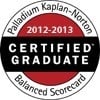Discover how HubSpot's powerful tools can significantly boost your website's SEO performance and drive organic traffic to your business.
Understanding the Importance of SEO
In today's digital landscape, having a strong online presence is crucial for the success of any business. One of the key elements that contribute to a successful online presence is Search Engine Optimization (SEO). SEO is the practice of optimizing your website to rank higher in Search Engine Results Pages (SERPs) and attract organic traffic. It helps your business get discovered by potential customers who are actively searching for products or services related to your industry.
By understanding the importance of SEO, you can make informed decisions and take strategic actions to improve your website's visibility and drive more organic traffic. HubSpot's powerful SEO tools can be your secret weapon in this journey.
What are SEO Tools?
SEO Tools are essential for improving your SEO efforts and achieving better search engine rankings. These tools help you analyze keywords, optimize on-page SEO, improve website performance, measure SEO success, and leverage social media platforms for SEO purposes. One such suite of powerful tools are HubSpot's SEO tools, which provide a wide range of functionalities to enhance your SEO strategy.
Hubspot's SEO Tools are Comprehensive and Unique
With HubSpot's SEO tools, you can uncover valuable insights through keyword research, identify high-performing keywords, explore long-tail keywords, and target specific audience segments.
Integrated Content Strategy Tool
Additionally, HubSpot's content strategy tools offer recommendations for improving existing content and creating comprehensive and interconnected content. The technical SEO tools help optimize the technical aspects of your website, while the reporting and analytics tools allow you to measure and analyze the success of your SEO efforts.
Integrate Hubspot and Google Analytics
By integrating HubSpot with Google Analytics or Google Tag Manager, you can gather valuable data and insights to drive more organic traffic. Furthermore, Google Search Console and HubSpot provide insights into your website's backlinks and linking strategy. With HubSpot's SEO tools, you have the power to supercharge your SEO improvement efforts and drive more organic traffic to your website.
Let's dive in a little deeper
Leveraging HubSpot's SEO Tools for Keyword Research
Keyword research is a critical component of any successful SEO strategy. It involves identifying the right keywords and phrases that your target audience is using to search for information related to your business.
Prerequisites for Successful Keyword Research
Before starting your keyword research, it is essential to have a deep understanding of exactly what you sell. This knowledge is crucial because it not only helps you identify the most relevant keywords for your business but also plays a vital role in shaping your overall messaging.
Align Keywords and Target Audience
By understanding your products or services inside and out, you can better align your keywords with your target audience's needs and intentions. This alignment ensures that your messaging resonates with your audience, making it more likely for them to engage with your content and convert into customers.
Know What You Sell
Additionally, knowing what you sell allows you to optimize your website and create content that effectively communicates the value you offer. So, take the time to thoroughly understand your offerings before diving into keyword research, as it will create a strong foundation for your SEO strategy and overall marketing efforts.
Discover Valuable SEO Nuggets
By leveraging HubSpot's SEO tools for keyword research, you can uncover valuable insights and discover new opportunities to optimize your website's content.
HubSpot's SEO tools provide comprehensive keyword research functionalities, allowing you to analyze search volume, competition, and trends.
Make Valuable Use of Pre-Existing Content
The keyword tool part of the Content Strategy helps you locate, among many functions, content you already have that might be the best content to support a pillar page.
Uncover High-Performing Keyword Opportunities
You can identify high-performing keywords that have the potential to drive significant organic traffic to your website. Additionally, you can explore long-tail keywords and niche topics to target specific audience segments and increase your chances of ranking higher in SERPs.
Use Hubspot's AI to Enhance Your Content
Hubspot has AI (Artificial Intelligence) capabilities integrated throughout the tool. This means that the AI is aware of the search term you are trying to optimize a page for. One place where this capability can be useful is in generating a more effective meta description. The meta description is just one of the meta tags you have to get right to help Google and the other search engines understand what your page is about.
Hubspot Optimizer Recommendations
Every page on your website needs to have a purpose. From a search engine stand-point, it means understanding each page's intended meaning and purpose, and at a higher meta level, understanding what the site is about. That's why the page level optimizer is so critical to getting your SEO dialed in.
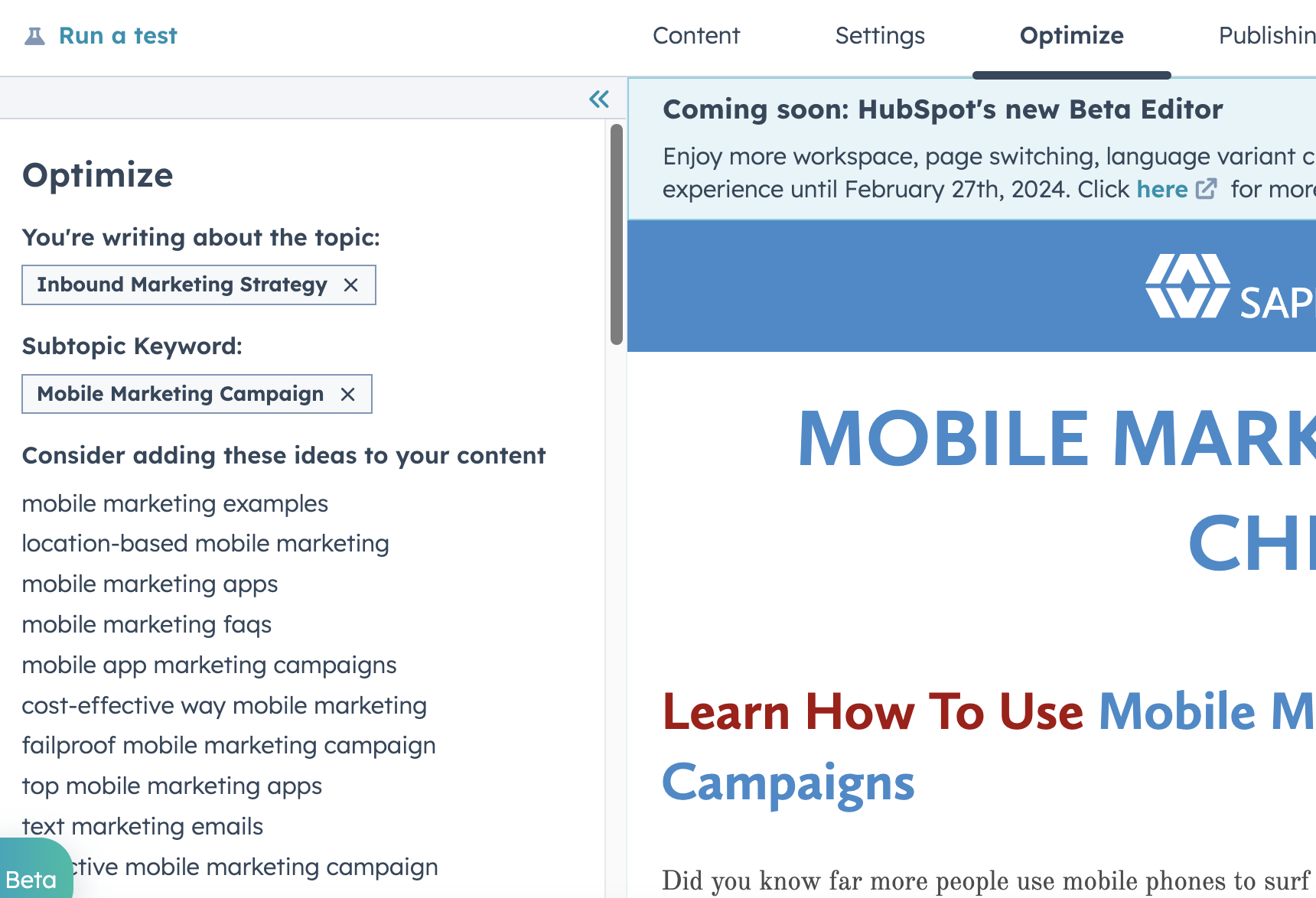
Page Level Optimizer
In the image above, I thought it would be useful to provide a quick walk-through of using this tool. To access the Hubspot page-level optimizer, you click where it says Optimize. Then you select the Topic you're writing about (this is typically the central Pillar Page), and then the Subtropic Keyword (Search Terms) this page is about. Then the system gets to work. The first thing you might see is the little note that says "Consider Adding These Ideas to Your Content", and then a list of phrases you should consider working working into the text of your page.
Step-by-Step Page Level SEO Recommendations
In addition to the Keyword Phrase recommendations the Hubspot On-Page SEO Recommendations, it provides recommendations all of the other elements on the page.

You can work through any issues identified within any of these areas to create truly high-performing pages.
Topic Cluster Creatiion
As mentioned before, you need to know what you sell and you need to know your audience. With this information in hand, and given Google's focus on Things not Strings, you now have to focus on creating what are variously known as Pillar Pages, Skyscraper Content or 10X pages. What they all have in common is the idea of one central comprehensive page supported by multiple supporting pages. Visualized within the Hubspot Content Strategy tool, you'll see a picture that looks like the image below.
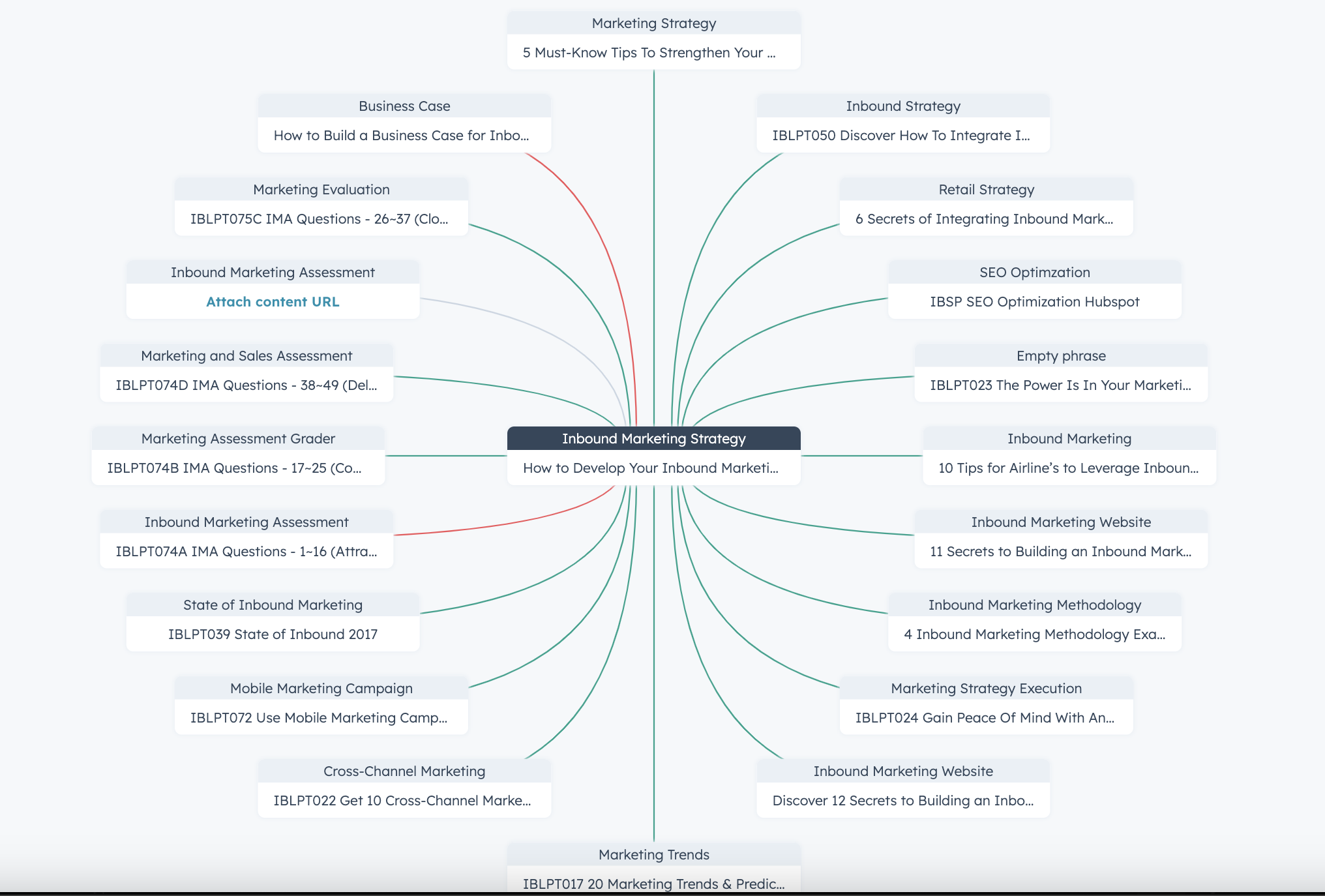
This is a real Pillar Page that and related content we have setup on our site, one of many. Let me help you interpret this page. The central node is the Pillar Page. The satelite nodes are connected pages, normally blog pages (but in some cases, there are exceptions).
The Green Lines represent internal links from the satelite page to the pillar page. The Red Line represents pages we have said are related to the pillar page, but are not yet linked to the central pillar page, but once where (sometimes). If a line exist only as a Grey Line, there is no link yet nor has there been.
How We Fix the Red Line
In the image below, we have clicked on one of the nodes with a missing link (Red Line). You get the little slide-out image pictured, which tells you many important pieces of information:
- Target Keyword
- Monthly Search Volume
- Link Status
- Page Type
- Status
- Search Terms the Page is for which the page is currently receiving traffic
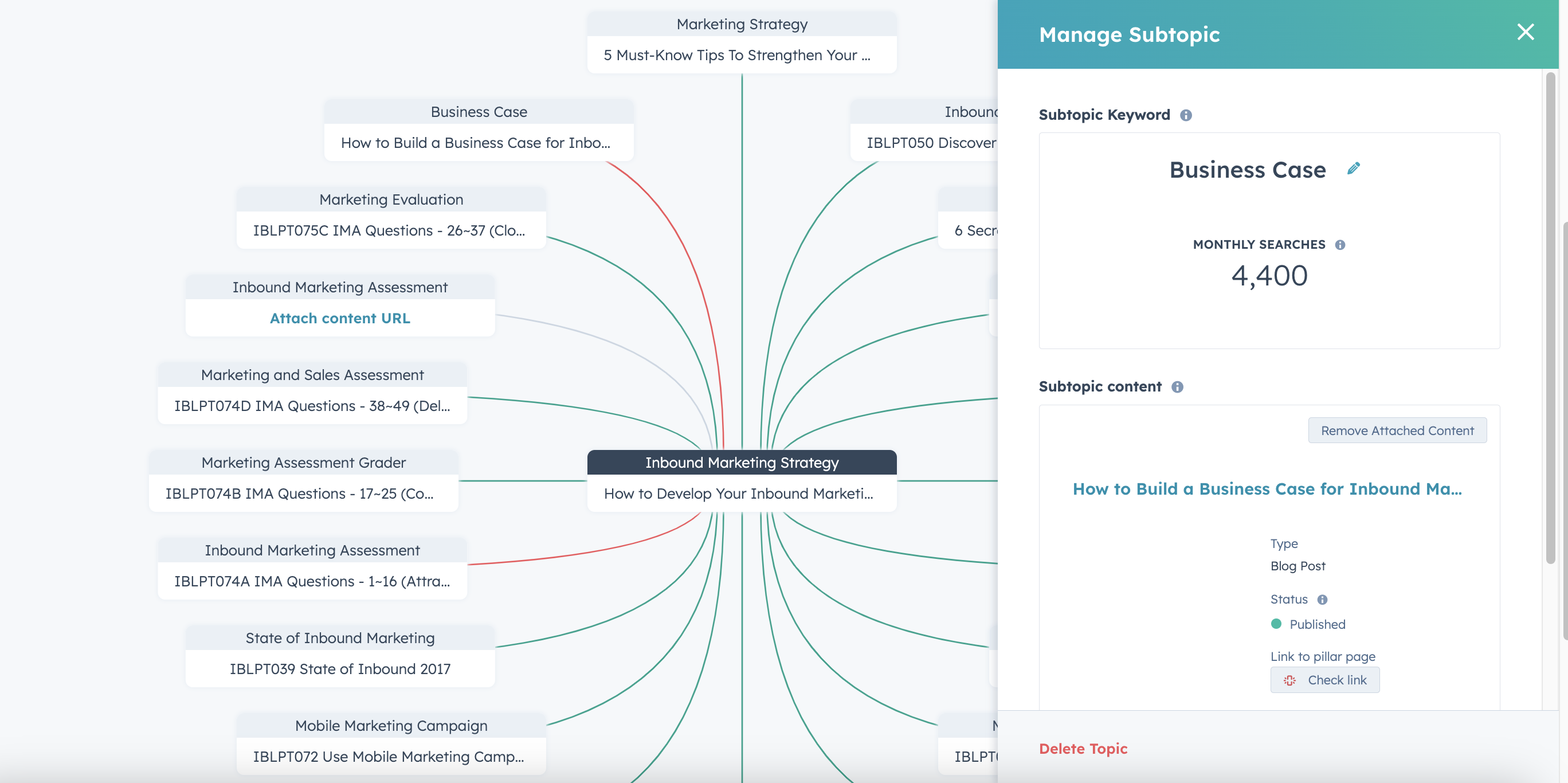
Getting a Website Wide SEO Assessment from Hubspot's SEO
Hubspot's SEO tools are not limited to scanning just a single page, but instead, they have the ability to scan an entire domain and provide and perform free SEO analysis. The SEO Analysis includes a comprehensive set of SEO recommendations. This is extremely beneficial for businesses as it allows them to identify and address any SEO issues across their entire website, rather than just focusing on individual pages. By scanning the entire domain, Hubspot's SEO tools can analyze factors such as keyword usage, page structure, meta tags, and internal linking, among others, to provide businesses with a holistic view of their SEO performance. This comprehensive approach ensures that businesses can work through any issues identified on their website and create high-performing pages that are optimized for search engines (which also are optimized according to Google's latest webmaster guidelines) and drive organic traffic. With Hubspot's SEO tools, businesses can confidently optimize their entire website and improve their overall SEO strategy.
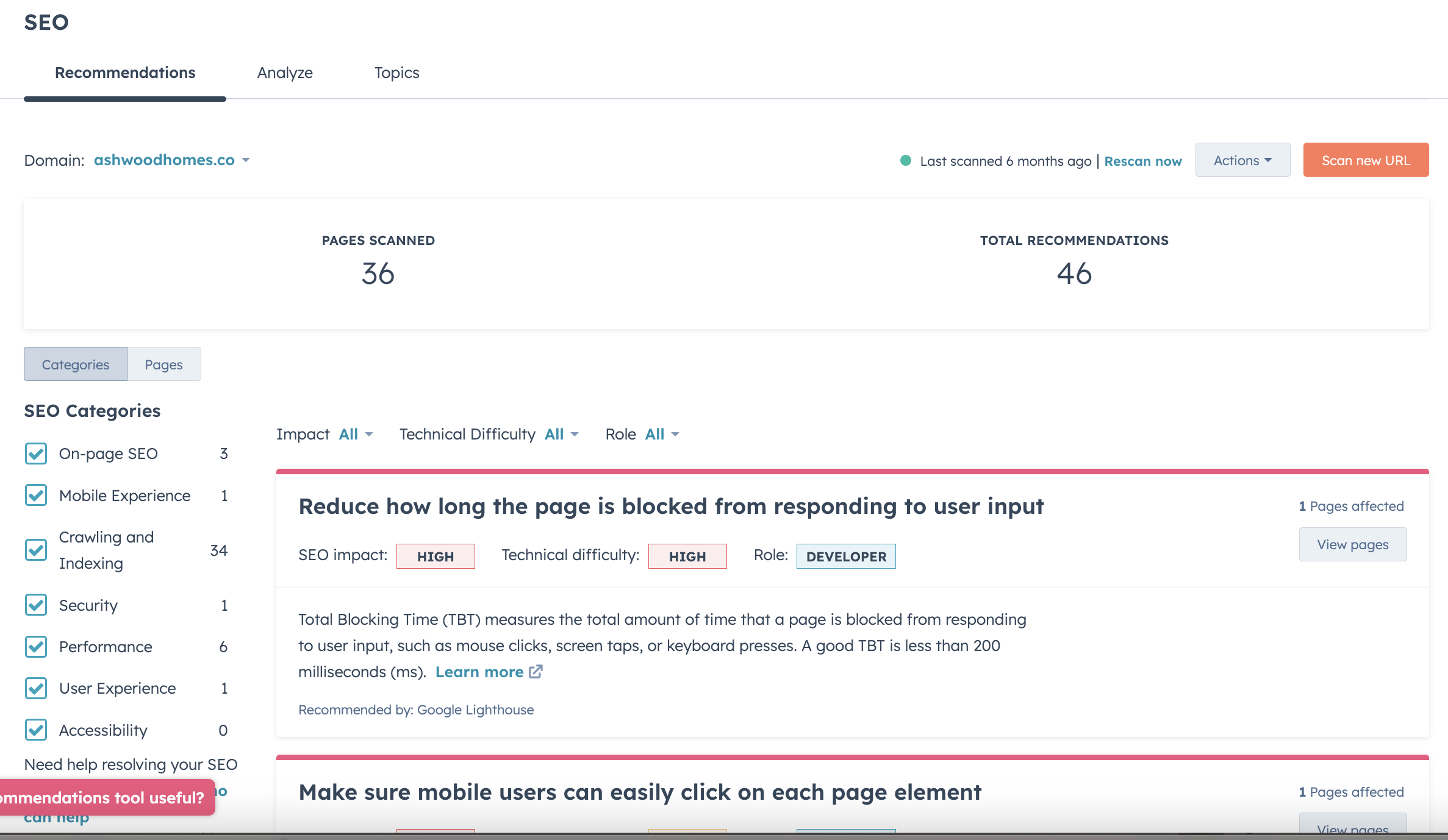
This Hubspot tool is unique in that examines both technical SEO issues and Inbound Marketing relevant issues.
XML Sitemap Creation
One of the little appreciated Hubspot functionalities is how it helps you create a XML sitemap. While tools like Yoast SEO and many others help you create sitemaps, Hubspot's is unique in that you can control which specific pages appear and don't appear, easily. This is not always easily done with other tools.
What's a Sitemap?
A sitemap is a file that lists all the pages on a website and provides important information about each page, such as its URL, last updated date, and priority level. There are two main types of sitemaps that a website can have: XML sitemaps and HTML sitemaps. XML sitemaps are specifically designed for search engines, providing them with a roadmap of all the pages on a website and helping them understand the site's structure and content. HTML sitemaps, on the other hand, are created for human visitors and serve as a navigational tool, allowing users to easily find and access different pages on the site.
Sitemaps Provide a Roadmap of Your Site
Search engine crawlers, like those used by Google, rely on sitemaps to discover and index web pages. When a search engine crawler comes across a sitemap, it can follow the links within the sitemap to crawl and index all the pages on the website. This is especially critical for websites with complex structures or dynamic content that may not be easily discoverable through traditional crawling methods. By providing search engines with a comprehensive sitemap, website owners can ensure that all their pages are crawled and indexed, increasing their chances of ranking higher in search engine results.
Having a sitemap is crucial for SEO success because it helps search engines understand the content and structure of a website, ensuring that all relevant pages are properly indexed. Without a sitemap, search engine crawlers may miss important pages or encounter difficulties in navigating the site. This can result in lower visibility in search engine results and missed opportunities for organic traffic. By creating and regularly updating an XML sitemap, website owners can improve their chances of ranking higher in search engine results and driving more organic traffic to their site. Additionally, HTML sitemaps can enhance the user experience by providing an easily accessible and organized list of pages, making it easier for visitors to navigate and find the information they are looking for.
Optimizing for Local Business Lead Generation
Hubspot's SEO tools are a valuable resource for local businesses looking to optimize their local SEO for optimal lead generation results. These tools provide comprehensive keyword research capabilities, allowing businesses to identify relevant keywords and topics to target in their content. By incorporating these keywords and topics into their website's pages, businesses can improve their visibility in search engine results and attract more organic traffic.
Locally Relevant Content Recommendations
Additionally, Hubspot's SEO tools offer content recommendations and performance tracking, enabling businesses to create high-quality, interconnected content that engages their target audience and boosts their website's SEO. Furthermore, Hubspot's suite of technical SEO tools empowers businesses to enhance the technical elements of their website, including factors like loading speed and mobile responsiveness, in order to boost their rankings on search engine result pages.
Each SEO tool has strengths and weaknesses.
But all of them have a roll to play in keyword research. Taken together, Hubspot's SEO tools provide local businesses with the necessary insights and functionalities to enhance their local SEO strategies and generate optimal lead generation results.
Combine With Google Keyword Planner
If you plan on running any paid advertising, and about 55% (according to Hubspot) of Inbound Marketers run Paid Advertising, then you have access to the Free Google Keyword Planner. As it is based on Google's most up-to-date keyword information, including CPC, you can combine Google keyword research results with Hubspot's Content Strategy Tool.
Google Trends - Things Not Strings
Google Trends is a free Google Tool that you should also incorporate in your Keyword Planning Process. You can put in just about any target keyword of interest to you and it will return the Topics people are searching for. It will also allow you to compare the search interest of two terms, over time.
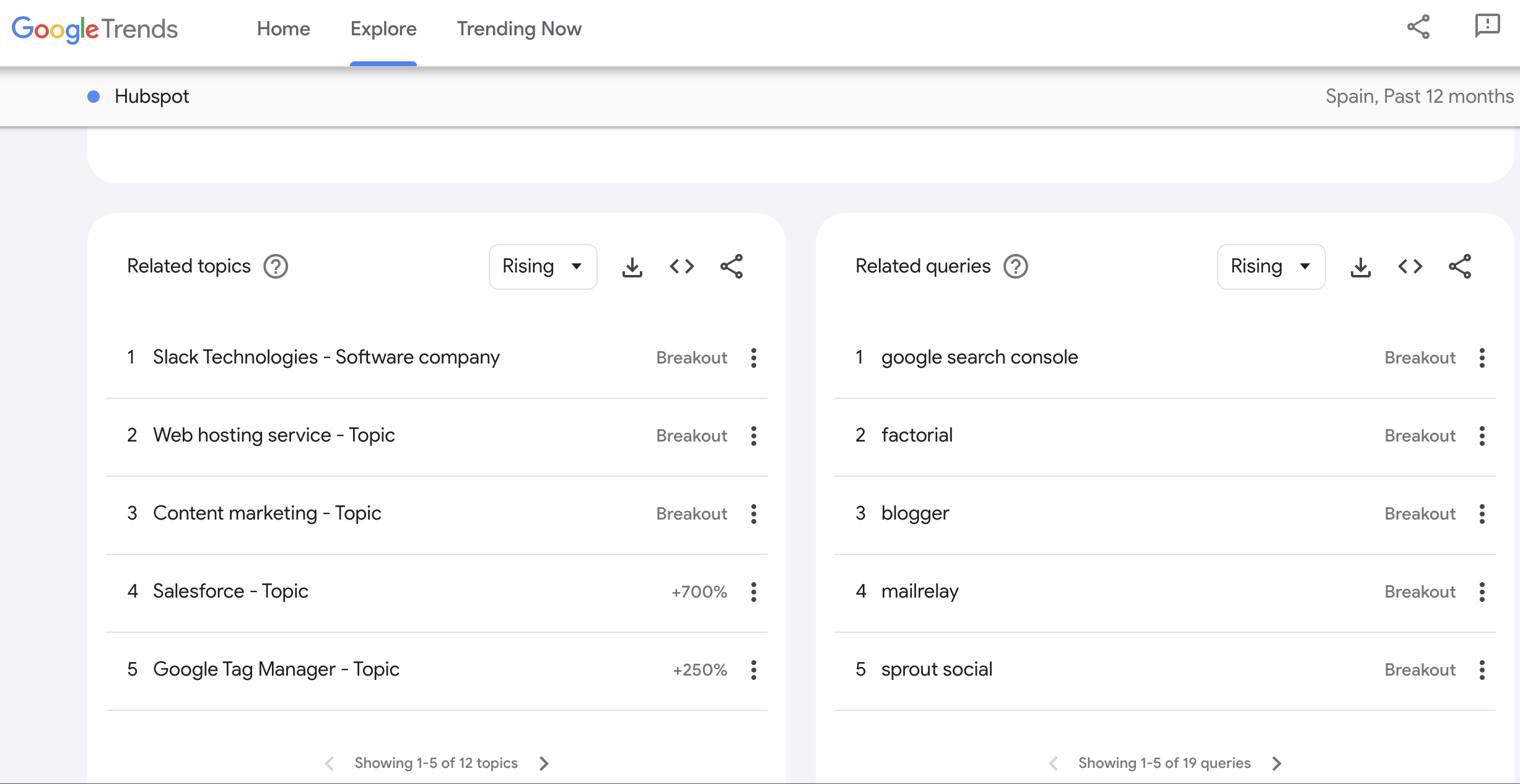
Use it to Explore Related Topics
While this tool is not directly integrated with Hubspot, at least not that you, a Hubspot user can see, researching the Topics of interest to your SEO efforts using this tool should be a part of your workflow.
Don't Forget About Competitive Analysis
Performing competitive analysis is crucial for any business looking to succeed in the digital landscape. By analyzing your competitors' strategies, strengths, and weaknesses, you can gain valuable insights that can inform your own marketing and content plans. One effective way to conduct competitor analysis is by utilizing tools like HubSpot and SpyFu.
HubSpot and SpyFu
With HubSpot's SEO tools, you can conduct comprehensive keyword research, analyze search volume and competition, and uncover high-performing keywords that can drive organic traffic to your website. Additionally, you can use SpyFu to gain insights into your competitors' SEO strategies, such as their top keywords and backlink profiles. Armed with this information, you can develop a differentiated content plan that targets specific audience segments and enhances your chances of ranking higher in search engine results. By systematically following these steps, you can stay ahead of the competition and optimize your website's visibility and organic traffic.
Hubspot and Answer the Public
Answer the Public is a powerful keyword research tool that can be used in conjunction with HubSpot's Content Strategy Tool to further refine and perfect your keyword strategy. Answer the Public helps you understand what questions and topics people are searching for related to your business. By entering a keyword or topic into Answer the Public, you can generate a visual map of all the possible questions, prepositions, and comparisons that people are searching for.
Hubspot and Keywords Everywhere
Keywords Everywhere and its Chrome Extension is a must-use keyword research tool due to the massive list of sites that it provides free search volume, CPC, and competition data for. I often use it in conjunction with Hubspot and any On-Page SEO optimization efforts I am involved in.
Hubspot and Screaming Frog
Screaming Frog is a powerful tool that allows you to do a deep dive into your website's structure. By crawling your website, Screaming Frog provides valuable insights into your website's architecture, including URLs, page titles, meta descriptions, header tags, and more.
Get Your Information Architecture Correct
This information can then be used to build or improve your information architecture in the HubSpot CMS. By analyzing the data from Screaming Frog, you can identify any issues or inefficiencies in your website's structure and make necessary adjustments to enhance user experience and search engine optimization. With a well-organized and optimized website structure, you can improve your website's visibility, increase organic traffic, and ultimately drive better results for your business.
Identify Relevant Keywords and Topics
This information can then be used in HubSpot's Content Strategy Tool to identify relevant keywords and topics to target in your content. By incorporating these keywords and topics into your content, you can ensure that your content is SEO relevant and optimized for search engines. This combination of Answer the Public and HubSpot's Content Strategy Tool allows you to uncover valuable insights and discover new opportunities to improve your keyword strategy and drive organic traffic to your website.
Google Data Studio
Google data studio allows digital marketers to easily create digital dashboards based on information coming from Hubspot websites via the integration with Google Analytics. Hubspot's Reporting Tool provides very advanced, comprehensive marketing and sales reporting capabilities. When you combine the two systems, as many clients do, you have almost magical analytical super powers.
Optimizing On-Page SEO with HubSpot's Content Strategy
On-page SEO refers to the optimization techniques applied directly on your website's pages to improve their visibility in search engine results. HubSpot's content strategy tools can help you optimize your website's on-page SEO effectively.
Targeted Improvement Recommendations
With HubSpot's content strategy tools, you can analyze the performance of your existing content and identify areas for improvement. The tools provide valuable insights into keyword usage, content structure, readability, and more. By optimizing your content based on these insights, you can enhance its relevance and appeal to both search engines and users.
Hubspot Page Level Smart Content
One of the more advanced SEO capabilities of Hubspot is the ability to dynamically change on-page content based on contextually relevant user information, such as who a lead is owned by. This means that your page can actually be performing exceptionally well, even if Google Analytics may not be able to detect this individual dynamic changes. This makes the Hubspot Analytics tool indispensable in understanding whether your contextually aware marketing efforts are working, and means your SEO evaluation needs to go beyond just the numbers.
Data-Driven Content Recommendations
Moreover, HubSpot's content strategy tools offer content recommendations, topic clusters, and content performance tracking. These features enable you to create comprehensive and interconnected content that boosts your website's SEO and engages your target audience.
Improving Website Performance with HubSpot's Technical SEO
In addition to on-page SEO, technical SEO plays a vital role in improving your website's performance and search engine rankings. HubSpot's technical SEO tools provide a range of functionalities to help you optimize the technical aspects of your website.
Actionable Technical SEO Improvement Recommendations
You can use HubSpot's technical SEO tools to analyze your website's loading speed, mobile-friendliness, crawlability, and more. These tools provide actionable recommendations to fix any issues that may be hindering your website's performance in search engine rankings.
Crawlability and Indexability Improvement
By addressing technical SEO issues, you can ensure that search engines can easily crawl and index your website, resulting in improved visibility and higher rankings. HubSpot's technical SEO tools make it easy to identify and resolve these issues, even if you don't have extensive technical knowledge.
Measuring and Analyzing SEO Success with HubSpot's Reporting and Analytics
Measuring and analyzing the success of your SEO efforts is essential to understand what strategies are working and where improvements can be made. HubSpot's reporting and analytics tools provide valuable insights into your website's SEO performance.
You can track key metrics such as organic traffic, keyword rankings, backlinks, and more using HubSpot's reporting and analytics tools. These tools offer customizable dashboards and reports that allow you to monitor your SEO performance in real-time and identify trends and patterns.
Data-Driven Decision Making
By leveraging these insights, you can make data-driven decisions and refine your SEO strategies to achieve better results. HubSpot's reporting and analytics tools empower you to measure the impact of your SEO efforts and continuously optimize your website for maximum visibility and organic traffic.
Hubspot Integration to Google Analytics
Integrating Google Analytics or Google Tag Manager (GTM) into HubSpot is a seamless process that allows you to take full advantage of both HubSpot's built-in SEO tools and Google's free SEO tools. By integrating these platforms, you can gather valuable data and insights to optimize your website's performance and drive organic traffic.
Track Key Performance Metrics
With Google Analytics, you can track key metrics such as organic traffic, keyword rankings, and backlinks, giving you a comprehensive view of your SEO efforts. On the other hand, Google Tag Manager simplifies the process of adding tracking codes and tags to your website, making it easier to measure and analyze the success of your SEO strategies. This integration also opens up opportunities to leverage additional Google tools like Google Maps, Google Business, and Google Merchant Center for ecommerce businesses. Overall, integrating Google Analytics or Google Tag Manager with HubSpot allows you to harness the power of data and make informed decisions to boost your website's SEO performance and drive more organic traffic.
Google Search Console
Discovering the backlinks your site has attracted organically with Google Search Console is a valuable insight for improving your website's SEO performance. Google Search Console allows you to see the external websites that are linking to your site, giving you an understanding of the quality and quantity of backlinks you have gained. By analyzing this data, you can identify the websites that are referring traffic to your site and determine the effectiveness of your link-building efforts. This information can help you refine your SEO strategies and focus on attracting more high-quality backlinks to boost your website's visibility and organic traffic.
Google Search Console and Hubspot
In addition to the insights provided by Google Search Console, HubSpot's powerful tools offer a comprehensive analysis of both internal and external links within each page of your website. This greatly facilitates SEO optimization by allowing you to easily identify and manage your internal linking structure, ensuring that search engines can effectively crawl and index your content.
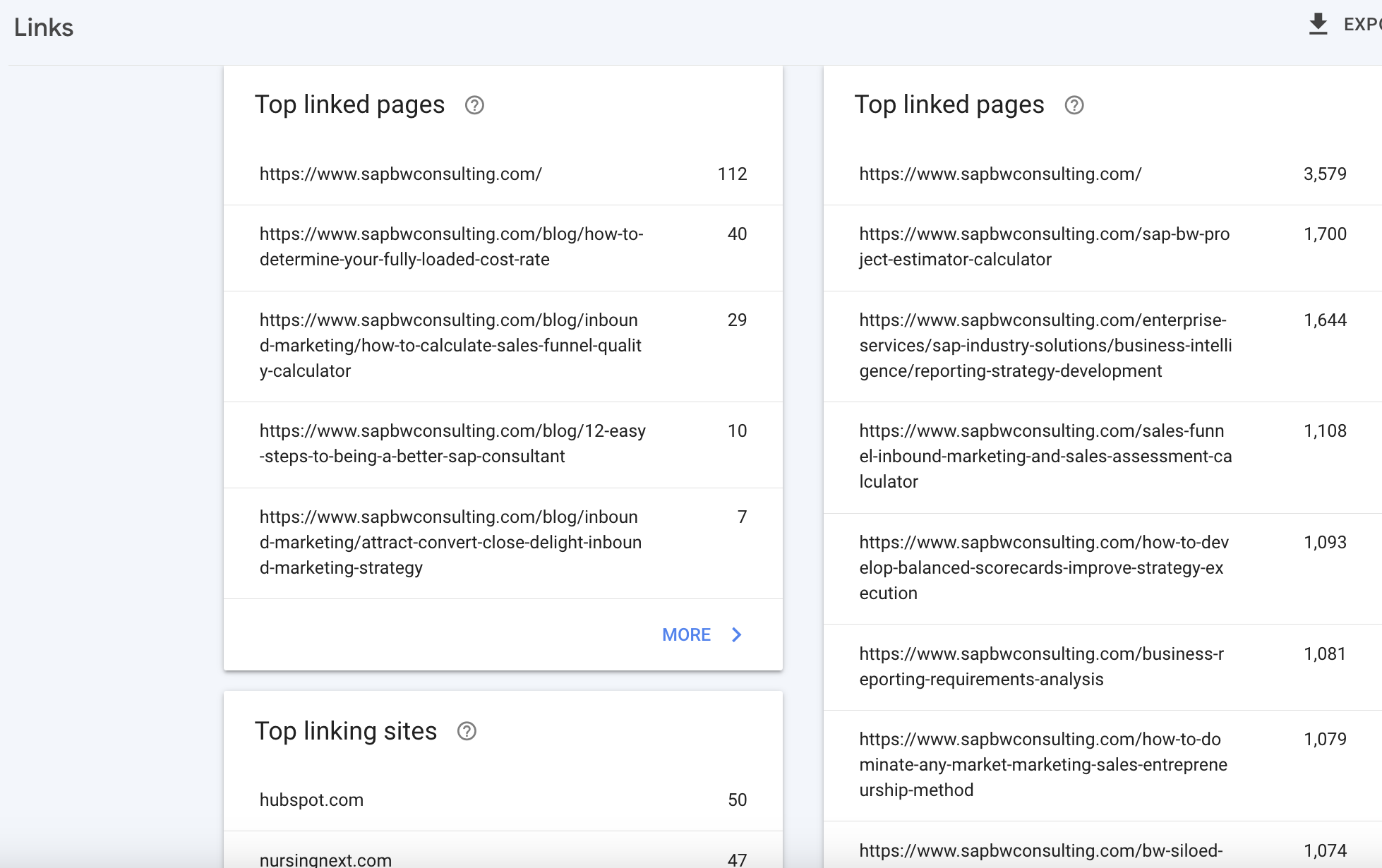
Moreover, HubSpot's tools also provide valuable information about external links, enabling you to monitor and analyze the quality and relevance of the websites linking to your content. By leveraging these insights, you can optimize your website's linking strategy, build stronger relationships with authoritative websites, and ultimately increase your chances of attracting organic backlinks. With HubSpot's SEO tools, you have the power to supercharge your link-building efforts and drive more organic traffic to your website.
Hubspot Social Media SEO Tools
HubSpot offers integration with various social media platforms, allowing businesses to enhance their SEO efforts. By integrating HubSpot with social media platforms such as Facebook, Twitter, LinkedIn, and Instagram, businesses can increase their online visibility and drive more organic traffic to their website. These integrations enable businesses to easily share their website content, blog posts, and other valuable resources across multiple social media channels, reaching a wider audience and increasing the chances of their content being shared and linked to by others. This social media integration helps with SEO by generating backlinks, improving brand visibility, and increasing engagement with target audiences. With HubSpot's social media SEO tools, businesses can effectively leverage their social media presence to boost their website's SEO performance and drive organic traffic.
Schema.Org Structured Data
Schema.org structured data is a standardized format that provides search engines with information about the content on a webpage. It helps search engines understand the context and meaning of the content, which in turn improves the visibility and relevance of the webpage in search engine results. HubSpot's Blog tool takes advantage of this by automatically generating dynamically generated structured data schema for each blog post. This schema data makes it easier for Google to understand what the webpage is about, improving the chances of it appearing higher in search results. By using HubSpot's Blog tool and leveraging structured data schema, you can greatly boost your SEO results and increase organic traffic to your website.
Find Out Your ROI from Investing in Hubspot Marketing and Sales
With all of these SEO boosting capabilities, maybe it's time to see whether the ROI from Hubspot is worth investing in.



